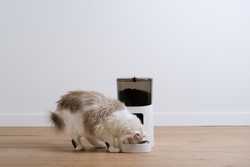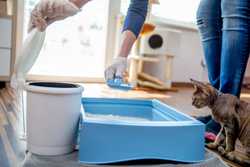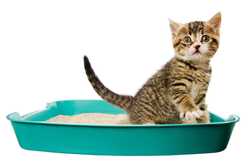How To Clean a Litter Box: Tips for a Fresher Home and a Happier Cat
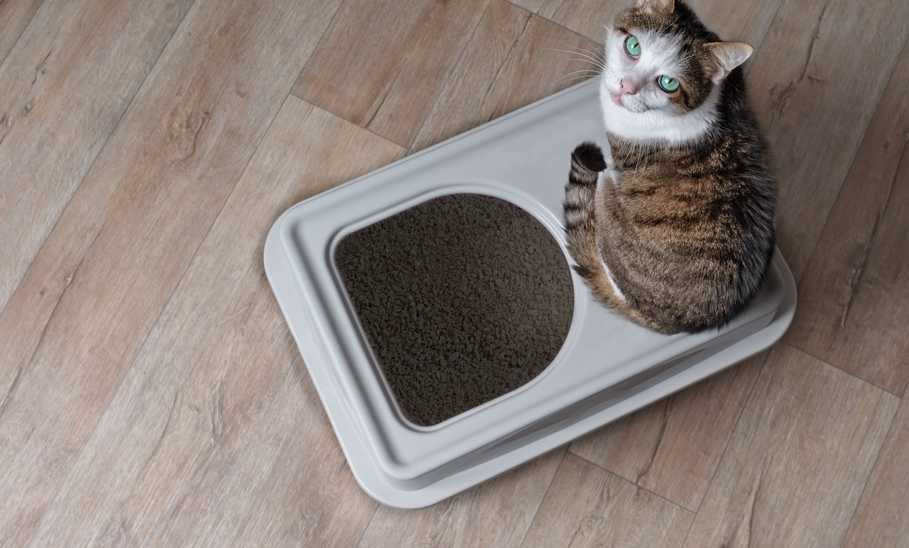
Our evaluations and opinions are not influenced by our advertising relationships, but we may earn a commission from our partners’ links. This content is created by TIME Stamped, under TIME’s direction and produced in accordance with TIME’s editorial guidelines and overseen by TIME’s editorial staff. Learn more about it.
If you think that litter box in the corner smells bad, imagine how much it must stink to your cat, whose little nose is 14 times more sensitive.) than yours. You can flush your toilet after you use it, but a cat is stuck with the harsh, acidic smell of an uncleaned box. As a result, it may “act out” by finding a cleaner alternative, which is definitely not something either of you are going to appreciate. It’s not only about making your space smell better, either. Keeping a litter box clean goes a long way towards preventing common health issues, such as urinary tract infections, ammonia-related respiratory irritation, and spreading salmonella around your home.
“If your cat holds it in, they can be at risk for medical conditions like Feline Idiopathic Cystitis (FIC), and urinary blockage can result in pain for the animal and veterinary visits and medication,” says Dr. Kelly Fishman, a DVM practicing in San Francisco. “These conditions may arise in cats with perfect and clean litter boxes, but keeping the litter box clean lowers that risk factor.”
Taking the time to maintain your cat’s litter box is a win-win for humans and pets alike, but even the most doting cat owners might not know the best techniques and habits you should adopt for keeping the litter box as clean as possible. According to Fishman, for example, the litter should be scooped daily and completely changed once a month, or twice a month with multi-cat households. “Also, don’t forget to wipe down the litter box and remove any leftover litter,” she says.
The first step to getting that pristine litter box is to empty it completely. Consider putting on your face mask and gloves to do this part, as feline waste is acidic, may carry parasites and illnesses, and, yes, smells awful. The more protection you have against accidental exposure to your cat’s urine and feces, the better.
Take the entire litter box outside and empty its contents directly into a trash can. Be sure to dump it into your waste receptacle slowly to prevent a kickback effect of bacteria-saturated dust, and if there are any lingering clumps of litter, it’s easy to scrape them off with a broom directly into the bin.
A full cat box may be heavy and unwieldy, but it’s important to only empty it outside to ensure unwanted odors and dust don’t escape into your home.
Pour a few inches of hot water into the empty litter box and let it soak for a few minutes. Stirring in some unscented dish soap will help to loosen any lingering litter or waste from the box, making it much easier to scour away any problem spots with a scrub brush, sponge, or paper towels. Be sure to clean all surfaces of the cat box, including its exterior sides and bottom, with soap and water to prevent the spread of harmful bacteria in your home.
Feel free to substitute dish soap with your preferred mild, scent-free, and non-toxic cleaning product. You may be surprised at how important an unscented cleaner is, but as mentioned earlier, house cats have a much sharper sense of smell than we do, so even a gentle citrus or pine scent could be overwhelming for your kitty, and may convince them to use places other than their cat box.
Once the litter box is completely dry, it’s time to pour brand-new litter into the box—slowly, to keep from knocking up a cloud of fine dust. While most cats do best with two or three inches of litter, felines with a digging and kicking habit should receive four or five inches to ensure that plenty of litter remains in the box after they’ve used it. Be sure to level out the kitty litter once it’s full, as cats find a flat layer of litter to be particularly appealing.
Every cat is different, of course, so do consider their needs when shopping around for the right litter for your home’s needs. For instance, cats that have the annoying habit of leaving a little trail of litter after using their box may need a low tracking variety that clumps more easily. Some pet owners need a lightweight litter that’s easy to haul from the litter box room to the garbage can, or a dust-free variant to minimize breathing it in, while environmentally conscious cat lovers will appreciate greener options, such a nontoxic wood-based litter.
Now that your kitty has a sparkling clean litter box, it’s best to keep it that way with a regular daily routine. Scoop out urine-soaked clumps and poop at least once or twice a day, or more if needed to keep the litter box fresh and to minimize odor.
Each time you scoop the litter box, you’ll be taking a fair amount of litter with you, so be sure to top off the box with extra litter afterwards. Depending on the quality of the litter and how many cats you own, you should completely replace its litter every one to five weeks. If you use a nice clumping litter, you’ll waste less litter when you spot-clean the box every day.
To keep a sanitary litter box (and your kitty happy), it’s good practice to empty and give their litter box a thorough cleaning every other week, using the steps above. "Scoop often,” says Leslie Ellis, Consumer Communications Manager for Healthy Pet. “It’s best to scoop a minimum of once per day and remove any feces as soon as possible. This will help keep the litter smelling fresh and therefore lasting longer. "
Per Ellis’ advice above, scoop out solid waste as soon as you can for an all-around cleaner litter box, and to minimize the spread of odors and bacteria in your home. Try to remove poop from the box once or twice a day.
Run the scoop through the entirety of the litter box from top to bottom to effectively remove clumps of urine. Using a quality clumping litter brand will make it much easier to scoop up these urine spots, while minimizing odor and allowing you to discard a little less clean litter per cleaning.
To keep a litter box fresher for longer, consider completely replacing its contents with new litter on a more frequent basis (once a week to every other week) to minimize odors. Taking the time to clean the litter box with soap and water between replacing the litter is the best way to keep the area around the cat box smelling better for longer. If you’re opting for a three-weeks to monthly schedule of a full litter replacement, you can still minimize odors after your daily scoop by wiping down the interior and exterior of the litter box and cleaning the surrounding floor area.
another option is to use a self-cleaning litter box:

For pregnant cat owners, be aware that cleaning a litter box can pose dangers you may not have considered. Toxoplasma gondii is a common feline parasite that is easily spread from cats to humans by coming into contact with the egg spores found in their poop. While this parasite rarely causes illness in adults, it may cause serious birth defects if a developing baby becomes infected. As a general rule, cats that exclusively live indoors are far less likely to contract this parasite than cats that freely go indoors and outdoors.
Per the information on the Centers for Disease Control and Prevention website, pregnant people should, “Avoid changing cat litter if possible. If no one else can perform the task, wear disposable gloves and wash your hands with soap and water afterwards,” They add that it’s important to, “Ensure that the cat litter box is changed daily. The Toxoplasma parasite does not become infectious until 1 to 5 days after it is shed in a cat’s feces.”
It is highly recommended, then, that pregnant people do not come into contact with the litter box or feline waste, and the best solution would be to have someone else in the household clean up after the cat. They should also speak to their doctor to learn the safest way to continue caring for their cat.
>>>check out our top recommendation for the best litter box for cats>>>
It’s true that everyone loves treating their feline friends to cute cat toys, tasty treats, and unlimited cuddles, but no one wants to clean the litter box. However, if you make it a regular habit to scoop away waste and give the litter box itself a good washing, not only will the job be that much less unpleasant, your cat will be happier and healthier because of the special care you’re providing them.
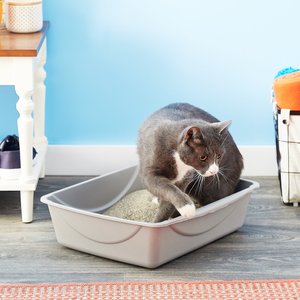
The rank odor of used cat litter can hang around the house long after you’ve scooped and thrown out waste and contaminated litter, but there are a few ways to lessen or eliminate cat litter smells:
Yes, but that depends on your cat’s natural behaviors. Most cats will be fine with two to five inches of litter in their box, but some cats are a little too enthusiastic about digging and kicking, resulting in a dusty mess around the cat box. If your cat’s a kicker, do yourself a favor by buying a litter box with taller, raised sides to prevent kicked litter from escaping.
Cat urine is high in ammonia, and if you leave it to collect in the litter box, both you and your cat could experience coughing, lung irritation, and even pneumonia. Your cat’s feces can attract pests such as flies and cockroaches if left for long periods. For the health and wellbeing of both you and your cat, please maintain the litter box.
Although scooping out waste every day will help minimize bacteria, the only time you can truly kill the bacteria infesting a litter box is to scrub the entire container with dish soap between litter changes. It’s a good idea to reduce and eliminate bacteria however you can to keep it from spreading to cat beds, toys, and other parts of your home.
If you need to freshen up the litter box and make it a little easier to dislodge clumps stuck to the sides, add a layer of baking soda to the walls and bottom of the box before refilling it. Baking soda will also help to absorb additional moisture and noticeably reduce odors.
Not only is ökocat’s completely natural, walnut wood litter sustainably sourced and free of the synthetic chemicals and additives commonly found in traditional clay litter, it’s dust free and lasts much longer, too.
Surprisingly resilient and color-coded so you don’t accidentally use one to clean anything other than the litter box, a Scrub Daddy sponge will make quick work of stuck-on substances without having to resort to harsh chemicals.
This extremely gentle, environmentally friendly, and hypoallergenic dish soap is our favorite option for washing away odor-causing bacteria.
Although this premium HEPA air filter was designed to eliminate unpleasant cat box smells, it makes quick work of sinus-congesting pollen, pet fur, dander, and dust, too.
You could easily find a more affordable kitty litter scoop, but this cast aluminum scoop is a snap to clean and the most durable option we could find.
The information presented here is created by TIME Stamped and overseen by TIME editorial staff. To learn more, see our About Us page.
